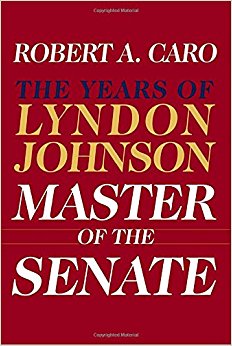Book: Master of the Senate by Robert A Caro
By Eric Antoine Scuccimarra I just finished two of the four books in Robert Caro's series "The Years of Lyndon Johnson." I read the last two, "Master of the Senate" and "The Passage of Power." I can't really say enough about how good these books were, and I'm really not sure that I need to. They have won Pulitzer Prizes and are widely considered to be among the best political books ever written. At well over 1,000 pages each, they are not exactly casual reading, but they are well worth the effort.
I just finished two of the four books in Robert Caro's series "The Years of Lyndon Johnson." I read the last two, "Master of the Senate" and "The Passage of Power." I can't really say enough about how good these books were, and I'm really not sure that I need to. They have won Pulitzer Prizes and are widely considered to be among the best political books ever written. At well over 1,000 pages each, they are not exactly casual reading, but they are well worth the effort.
The last history book I wrote about here was "The Rise and Fall of the Third Reich," and reading the Caro books really highlighted what was wrong with that book as a serious history. Caro does not take a moral position on his subjects. He reports the details of what happened and the reasons why and it's effects, but does not add his personal opinions in. The level of detail indicates the huge amount of research he did to write these books, and the books present a very engaging narrative, but he lets the facts speak for themselves. I also now understand why historians feel that they need some distance from their subject.
What really jumped out at me was how little politics has changed since the days of Johnson. Today, we tend to think of the corruption and influence of money in politics as a relatively recent development but that is absolutely not the case. I believe some of that bias has to do with the way history is taught in American public schools - Presidents are always above reproach, progress is constant, problems are encountered and shortly after are solved never to rear their ugly heads again. (See Lies My Teacher Told Me for an in depth analysis of this.) In school, American history is greatly whitewashed and anything that might reflect badly on the country is eliminated or glossed over.
One of my favorite stories from these books is how in Johnson's first Senate race, he was behind in votes. Then at the last minute, 300 extra votes were "found" for Johson, in alphabetical order, all in the same handwriting, just enough to put Johnson over the top. While today something like this would be a huge scandal, at the time it didn't seem to be too big of a deal, just business as usual.
Johnson switched position on issues constantly, depending on what would be the most politically favorable stance for him to take. Whether he needed to keep wealthy donors happy, needed to appeal to a segment of the population he felt he needed on his side, or whether it was all just internal Senate posturing he had little hesitation on switching his position whenever it benefitted him to do so. No one knows how he really felt about controversial issues such as civil rights, and it may be that he didn't really have a firm opinion on way or the other besides what was most advantageous at the moment.
In the end Johnson was a great man because he did great things, not because of his personality or his dedication to social causes. It seems as if all he really cared about was power, and it is just lucky for the world that what he did to gain that power was mostly beneficial to the country, because it could easily have been otherwise.
Although I have been reading these books for months now, I am sad to have finished them and I anxiously await the fifth and final chapter of the Years of Lyndon Johnson, which Caro has said is forthcoming.